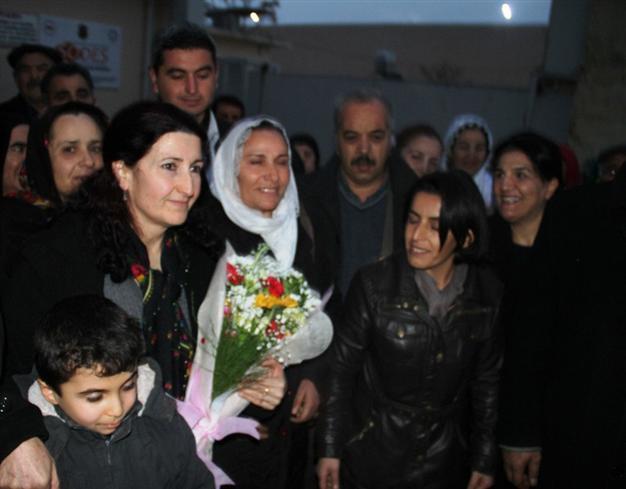Two jailed Kurdish lawmakers released upon top court’s ruling
ANKARA – Hürriyet Daily News

Gülser Yıldırım was greeted by her son and other relatives at her release along with İbrahim Ayhan from Mardin prison Jan. 3 upon a Constitutional Court's ruling. Cihan photo
A court in the southeastern Anatolian province of Diyarbakır has released Jan. 3 two jailed Kurdish lawmakers who were detained as part of the Kurdish Communities Union (KCK) trial, hours after announcing a Constitutional Court ruling on Jan. 2, which established the two’s lengthy detention violated their rights.
The two deputies, İbrahim Ayhan and Gülser Yıldırım who won seats for the Peace and Democracy Party (BDP) in June 2011 election, were released upon a prosecutor’s request based on the top court’s ruling. Both lawmakers were under custody since 2010.
The Constitutional Court ruled in favor of the complaints filed by both lawmakers on the grounds that their detention violated the rights of an elected person and was excessive in duration.
The individual applications of three other jailed deputies – Selma Irmak and Faysal Sarıyıldız from the BDP, as well as BDP-supported independent deputy Kemal Aktaş – are waiting for a decision.
The court also accepted compensation demands, ordering the payment of 3,000 Turkish Liras in emotional damages to both lawmakers.
Balbay case lawIn Ankara, hours before the local court obeyed the top court’s ruling and released the deputies, Parliament Speaker Cemil Çiçek drew the attention on the necessity of resolving the problem of arrested lawmakers through a legal amendment in order not to face larger and complicated political problems in 2015, before general elections.
“Whether it be the one under arrest, or even it a case along the process of the Supreme Court of Appeals, there is a very serious problem here. If we say ‘Those who have been released are released; hereafter, it is not concerning us,’ then a storm will come up in 2015. I’m underlining this. Nobody should put off for tomorrow what he can do today and let’s not have society pay anymore prices,” Çiçek said at a gathering with Ankara bureau chiefs of media outlets as he focused on prospects for the year 2014.
“Let’s resolve this problem altogether,” Çiçek said, calling on political parties. “Let’s not disrupt peace.”
Five jailed lawmakers – BDP deputies Ayhan, Yıldırım, Irmak and Sarıyıldız, as well as BDP-supported independent deputy Aktaş – filed individual complaints to Turkey’s top court for their release after a local court refused to grant their freedom two weeks ago. Their demands for release were rejected even though Republican People’s Party (CHP) lawmaker Mustafa Balbay was freed in similar circumstances last month. Balbay was convicted in the Ergenekon coup case trial, but an appeal process for the case is ongoing.
The Nationalist Movement Party (MHP) lawmaker Engin Alan, who has been convicted to 28 years in jail in the Balyoz (Sledgehammer) coup case trial, faces losing his parliamentary seat. The Supreme Court of Appeals, which approved Alan’s sentence last October, is reportedly preparing a letter to annul Alan’s mandate as an MP, as the last appeal was settled. Alan’s parliamentary seat may become invalid after the letter is read out to the General Assembly.
Speaking with the Anadolu Agency late on Jan. 2, BDP Deputy Chair Meral Danış Beştaş described the top court’s decision concerning Ayhan and Yıldırım as “an important step.”
“Rather than the decision, we consider their rapid handling [of the applications] positive. This was also our demand.
The BDP’s co-leader Gültan Kışanak, speaking to reporters in Diyarbakır on Jan. 3, maintained that refusal of the BDP deputies’ release despite the Balbay case law at the time displayed an example of discrimination.
“It was an example of understanding a ‘special law’ and a ‘special state’ against Kurds,” Kışanak said.
“Lengthy detention is a fundamental problem of law in Turkey. The problem should be resolved through a legal amendment and in a serious way and radically.”
